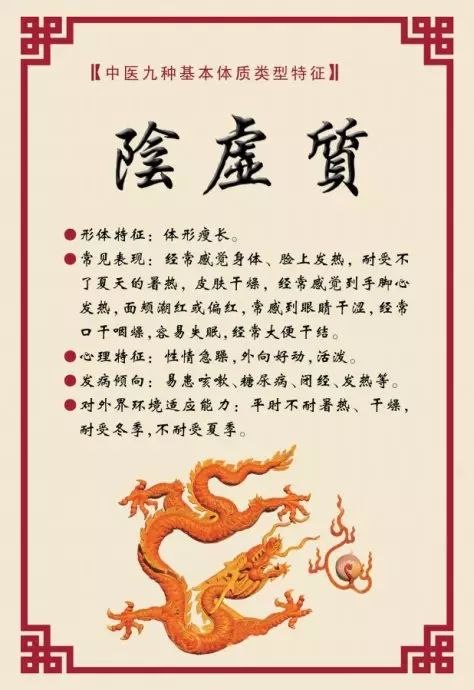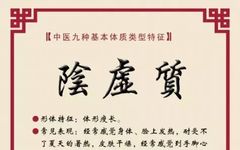This article introduces: What are the manifestations of Yin deficiency constitution? What are the symptoms of Yin deficiency constitution? Individuals with Yin deficiency primarily suffer from a deficiency of Yin fluids. Let us take a look at the specific symptoms.

Manifestations of Yin Deficiency Constitution
Yin deficiency refers to the result of a deficiency of Yin fluids such as essence, blood, and body fluids within the body. When Yin fluids are deficient, the body exhibits two types of manifestations: one is a reduction in the nourishing and moistening functions of Yin fluids, leading to symptoms such as decreased organ function and dry skin; the other is that when Yin energy is deficient, it cannot restrain Yang energy, resulting in an excess of Yang energy and the easy generation of dryness and heat within the body. The Huangdi Neijing states: “When Yin is deficient, there is internal heat.” The constitution of Yin deficiency is characterized by a deficiency of Yin fluids, an excess of Yang heat, and a tendency to generate dryness and heat. Individuals with Yin deficiency often present with symptoms such as heat in the palms and soles, dry mouth and throat, slight dryness of the nose, red and slightly dry lips, a preference for cold drinks, irritability, excessive heat, dry skin prone to wrinkles, and dark pigmentation. The inability of Yin energy to restrain Yang energy leads to internal heat, resulting in symptoms such as flushed complexion, dry eyes, blurred vision, dizziness, ear pain, easy sweating, poor sleep, intolerance to heat, irritability, and a feeling of heat. Common types of Yin deficiency include Lung Yin deficiency, Heart Yin deficiency, Spleen Yin deficiency, Stomach Yin deficiency, Liver Yin deficiency, and Kidney Yin deficiency.
Heart Yin Deficiency
Heart Yin deficiency refers to a deficiency of Heart Yin and blood, which fails to nourish the heart, leading to a reduction in the heart’s functions of governing blood vessels and spirit, resulting in internal heat disturbance. Symptoms include a red tongue with little moisture and a thin, rapid pulse. The deficiency of Heart Yin leads to internal fire, which can disturb the spirit, resulting in symptoms such as palpitations, irritability, anxiety, forgetfulness, heat in the palms and soles, insomnia with vivid dreams, and a flushed face.
Lung Yin Deficiency
Lung Yin deficiency refers to the internal generation of heat due to a deficiency of Lung Yin. Symptoms include a red tongue with little coating, a thin, rapid pulse; dryness of the mouth and throat, emaciation, afternoon heat, night sweats, dry skin on the cheeks, and hoarseness. The deficiency of Lung Yin leads to a loss of its moistening nature, causing Qi to rebel upwards, making it easy to cough. Lung Yin deficiency generates internal heat, leading to phlegm that is difficult to expectorate, especially phlegm with blood.
Spleen Yin Deficiency
Spleen Yin deficiency refers to a series of problems caused by a deficiency of Spleen Yin, which fails to nourish and transform. Symptoms include a pale red tongue with little or no coating, a thin and weak pulse; the mutual root of Yin and Yang is affected, leading to weakness of both Spleen Yang and Qi, reduced food intake, and abdominal distension after eating; the failure of transformation and nourishment leads to symptoms such as dry mouth with no desire to drink, dry retching, emaciation, fatigue, skin prone to wrinkles, and constipation. The Spleen is the source of Qi and blood production; if it fails to function properly, Yin cannot restrain Yang, leading to internal heat, resulting in symptoms such as restlessness, irritability, a preference for coolness, and heat in the palms and soles.
Stomach Yin Deficiency
Stomach Yin deficiency refers to problems arising from a deficiency of Stomach Yin, leading to a loss of moistening and descending functions. Symptoms include a red tongue with a dry center, little coating or a glossy red tongue, and a thin, rapid pulse. A deficiency of Stomach Yin leads to a lack of fluid production, resulting in thirst, dryness of the throat, easy accumulation of food, poor digestion, a lack of appetite despite hunger, and discomfort in the chest after eating. Insufficient Stomach fluids lead to impaired descending function, resulting in difficulty swallowing, dry retching, and constipation.
Liver Yin Deficiency
Liver Yin deficiency, also known as Liver Yin deficiency, refers to the internal disturbance of heat due to a deficiency of Liver Yin, which fails to restrain Yang. Symptoms include a dry red tongue and a thin, rapid pulse. The deficiency of Liver Yin leads to excessive Yang rising, resulting in symptoms such as dizziness, dry eyes, blurred vision, sunken eyes, dark circles, skin prone to spots, dry and itchy skin with scales, vague pain in the ribs, emotional discomfort, excessive heat, easy numbness in the limbs, and slight tremors.
Kidney Yin Deficiency
Kidney Yin deficiency refers to the internal generation of heat due to a deficiency of Kidney Yin and its nourishing function. Symptoms include a red tongue with little moisture and little coating, a weak or thin, rapid pulse. The deficiency of Kidney Yin leads to emptiness of the brain marrow and a lack of nourishment to the bone marrow, resulting in symptoms such as dizziness, ear pain, hearing loss, loose teeth, premature graying of hair, hair loss, weakness in the lower back and knees, and memory decline.
The Yimen Banghe states: “This is a constitution of excess Yang and deficient Yin; in every illness, there is often fire, and one must use methods to nourish Yin and clear fire.” This indicates that individuals with Yin deficiency constitution often tolerate winter but not summer, are intolerant to dryness and heat, and are prone to Yin deficiency and dryness-heat diseases, or may easily show signs of Yin deficiency after illness. Therefore, individuals with Yin deficiency constitution should focus on nourishing Yin and clearing heat in their diet.
Care for Yin Deficiency Constitution
The key to nourishing Yin deficiency constitution lies in replenishing Yin. Individuals with Yin deficiency should follow the principles of nourishing Yin, clearing heat, and nourishing the Liver and Kidneys. Among the five organs, the Liver stores blood, and the Kidneys store essence, both residing in the lower jiao, thus nourishing the Liver and Kidneys is essential. Individuals with this constitution tend to be irritable and often feel anxious and angry, which is due to the excess fire disturbing the spirit; therefore, they should adhere to the principles of “calmness and emptiness” and “keeping the spirit within” as stated in the Huangdi Neijing.
Such individuals are often slender, and thin people tend to have excess fire, often experiencing heat in the palms and soles, dry mouth and throat, a preference for coolness, and difficulty tolerating summer heat. Therefore, in hot summer, they should pay attention to avoiding heat. In terms of dietary care, they should nourish Yin and subdue Yang, preferring light foods and avoiding greasy, rich, and spicy foods. Individuals with Yin deficiency constitution should consume foods that are sweet, cool, and neutral, such as wheat sprouts, vinegar, mung beans, peas, spinach, bamboo shoots, water spinach, winter melon, lotus root, lily, loofah, tomatoes, cucumbers, bitter melon, seaweed, pears, oranges, melons, white radishes, coconuts, tofu, soy milk, Shandong cabbage, and water chestnuts. They should avoid garlic, chili, pepper, coffee, durian, lychee, longan, cherries, walnuts, red beans, leeks, garlic, and ginger.

